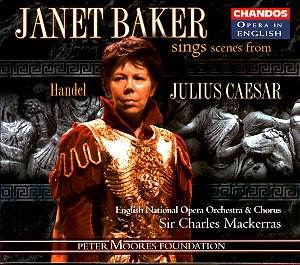This CD is an excellent souvenir of Dame Janet Baker
as a peerless performer of Handel. She was a fine, dramatic opera singer,
perhaps most effective in the works of composers such as Monteverdi,
Cavalli and Gluck but, above all, in Mozart and Handel. The recording
from which these excerpts are taken was made by EMI, and I think it
took place in conjunction with a full production of the opera by English
National Opera. At a time when that opera company’s fortunes appear
to be at a low ebb in all sorts of ways it is good to be reminded of
a more successful chapter in its history.
The cast list is an impressive array of excellent British
singers. However, as the focus of this disc is on Dame Janet we get
little chance to hear her colleagues with the exception of Valerie Masterson.
What we do hear of the other members of the cast, however, indicates
performances of a uniformly high standard.
Valerie Masterson is a touching, vulnerable Cleopatra.
Her ‘Lamenting, complaining’ (track 9) is sung with an aching beauty
which amply justifies Caesar’s recitative part way through ("Great
Jove in his heaven has no melody to equal such peerless singing.")
This lovely aria shows Handel at his lyrical peak and Miss Masterson
gives a performance of it to treasure. She is equally fine in the much
happier duet, ‘Dearest, fairest’ (track 22) where her voice blends beautifully
with Baker’s.
Vocally, the star of this CD is Dame Janet. The role
of Caesar might have been written for her and she conveys admirably
the various facets of the hero as portrayed by Handel. In her opening
aria, ‘Kneel in tribute’ (track 2) she is suitably imperious, with all
the divisions absolutely secure and employed to great dramatic effect.
In ‘Fleet o’er flowery meadows gliding’ (track 11), where she is partnered
by an excellent violin soloist, she catches to perfection the impetuous
ardour of Caesar, eager to meet Cleopatra. The most famous of Caesar’s
arias, ‘How silently, how slyly’ (track 7) is delivered superbly with
some really imaginative decoration. Once again, the obbligato (a horn
this time) is very fine.
If Dame Janet is the heroine of this enterprise then
the hero is Sir Charles Mackerras. During his long and distinguished
career he has only worked to a fairly limited
extent with period instrument ensembles. Most of the time, as here,
the orchestras he conducts play on modern instruments. However, in everything
he does, from Handel to Janáček, his work is unfailingly stylish,
informed and, in the truest sense, authentic both to the text
and to the spirit of the music. Suffice to say that this performance
is up to his usual standards with the recitatives paced most convincingly
and all rhythms lively and alert. He gets first rate playing from the
ENO orchestra and equally good singing from the chorus. As for the soloists,
they receive from him the kind of support in which they must have delighted.
This selection includes two complete scenes (Act II,
Scene 1 and Act 111, Scene 3) and the rest of the excerpts make sense
out of context. Chandos helpfully supply not only full texts and translations
but also a synopsis of the whole opera which distinguishes those parts
of the action not covered by these extracts. There is an interesting
note which, I suspect, came from the original release of the full opera.
Unfortunately much of the note concentrates on the role of Cleopatra
and scarcely at all on that of Caesar but it still includes some interesting
comments about Handel and opera seria. The recorded sound is
first rate.
Those who insist on hearing Handel’s operas sung in
Italian and played on period instruments may pass by this CD. That would
be a great pity for it gives a very good representation of a supreme
Handelian in a major role. If you value distinguished, stylish and dramatic
singing and conducting of Handel then you should add this disc to your
collection without delay. For the general collector who may not want
a full Handel opera this is an ideal chance to hear one of the very
finest singers of the post war generation singing music by a composer
who always brought out the very considerable best in her.
Chandos deserve our thanks for making this recording
available once again. Strongly recommended.
John Quinn


